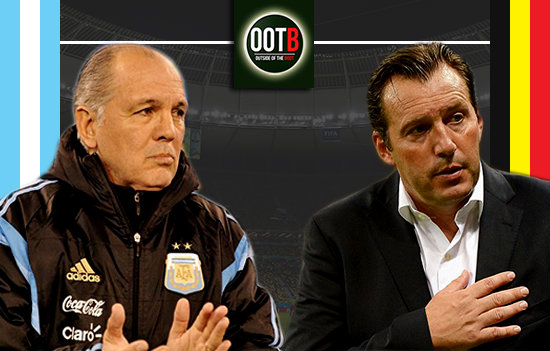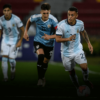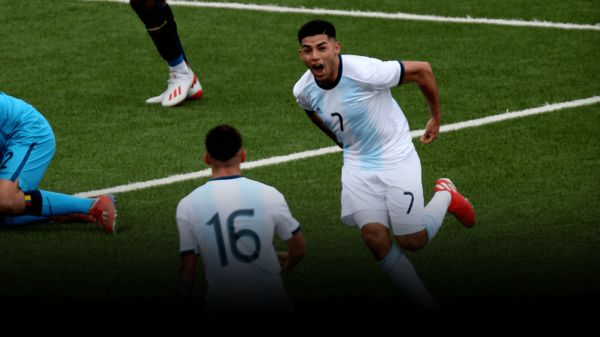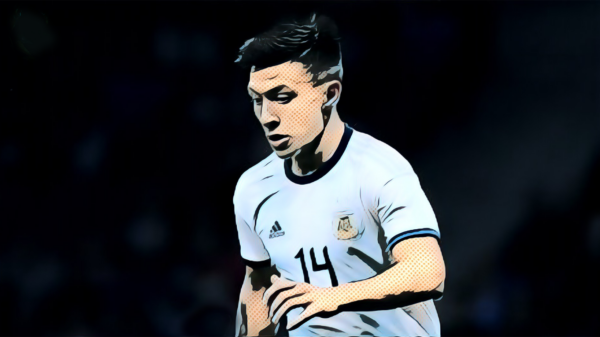As we move into the latter stages of the competition, we will look ahead to the enthralling encounters with three key tactical questions that could determine which way this game swings. Phil Baki here has a look at the Argentina vs Switzerland World Cup Quarter-Final clash.

With Argentina being pushed to the brink of a penalty shoot-out by Switzerland and Belgium being tested in extra time by the United States, both quarter-finalists have had difficult routes to this stage, but both have earned it. However, despite both teams remaining undefeated in the competition and Lionel Messi having the tournament that everyone expected from him, neither team has assuaged all of the doubts that critics hold against them. Here we’ll address the three main concerns as two teams who were seen as potential contenders in this competition (one more than the other) clash in the last eight.
Is It Possible to Stop Lionel Messi?
Yes. At some point, someone has been able to contain Lionel Messi. His goals in the group stage against Bosnia and Herzegovina, Iran and Nigeria were all vital. Without Lionel Messi, Argentina would have finished the group with 2 points losing to Nigeria and drawing with Iran. He provided the assist on Angel Di Maria’s late winner against Switzerland. Clearly, any success Belgium will have will come through the Barcelona superstar. The key will be forcing Messi out wide.
RELATED ARTICLES
Tactical Analysis: Argentina 1-0 Switzerland
Tactical Analysis: Belgium 2-1 USA
In the Round of 16, Messi created 8 chances, with only 1 coming off of a cross (according to WhoScored). Everything he created came from a far more central position, including the pass that set up the winning goal. His goals in the group stage came mainly from cutting into the middle of the field after running down the right. If Belgium are to contain one of the world’s greatest, Axel Witsel and Marouane Fellaini will need to help crowd the center of the field. They will not be able to go forward with the same freedom with which they attacked the USA, but their work rate will be vital to keeping Lionel Messi quiet.
The issue with this approach is that neither Witsel nor Fellaini are known for their defensive qualities. With a combined 0 tackles, 1 interception and 4 clearances, the midfield duo may need a strong talking-to from manager Marc Wilmots in order to reinforce the fact that their main responsibility should be breaking up Messi’s forward runs and passes. For an example of this, they should look no further than Switzerland’s Gokhan Inler, who frustrated Messi for 118 minutes. If Belgium cannot replicate that, they will struggle.
Where else are Argentina’s goals coming from?
We’ve talked about Messi’s importance to this Argentina side already, but have failed to mention the fact that Argentina are packed to the brim with world-class attackers who have just failed to reproduce their club form for their country. Sergio Aguero is out for the remainder of the World Cup with an injury but even before the injury had struggled in Brazil. Ezequiel Lavezzi and Gonzalo Higuain were next on the list of forwards but as in Aguero’s case, they’ve failed to fire in this World Cup. You can expect Higuain to retain his role as the lone striker up front. Lavezzi has always been preferred on the flanks and despite being substituted in favor of Rodrigo Palacio against the Swiss, the PSG attacker will probably be preferred to the Inter man.
So with Alejandro Sabella unlikely to make many major changes to his lineup, the issue is that the production from Higuain and Lavezzi is simply not enough. Could it be that Argentina are simply thin (relatively speaking) on attacking options. Sabella may reach to his bench with Palacio and Maxi Rodriguez providing some options in the midfield but he will most likely just demand more from Lavezzi and Higuain.
His last option could be to put Messi into a false nine role and play a 4-3-3 with Di Maria and Lavezzi either side of Messi. This would give the wide players a little more license to drift inside and shoot, which could lead to more opportunities. It also keeps Messi toward the middle of the park but will put the onus on the midfield to provide him with service so he does not have to drop too deep in order to receive the ball.
Are the Belgian full-backs still a concern?
Belgium’s match against the United States was perhaps more of a contest due to an unbelievable performance by Tim Howard, but it has to be said that despite all of their dominance, the USA did find some joy. It was down Belgium’s left flank. There were two main reasons for this: first, Vertonghen is not the most comfortable at the left-back position and second, Eden Hazard does not track back. DeAndre Yedlin and DeMarcus Beasley were two of the USA’s best players on the night and Belgium’s inability to track down the flanks was a major factor in that.
The overlap will most likely be profitable for Argentina and with Lavezzi and Pablo Zabaleta flying down Argentina’s right wing, they will most likely be able to exploit space in two-on-one situations against Vertonghen. And do not be shocked if Di Maria and Marcos Rojo also find success down the left against Alderweireld and either Mertens or Mirallas. However, they will need to improve their crossing in order to make this possible advantage count. They only completed 10 of their 52 crosses against the Swiss and did not convert one of them. If they can begin to convert these chances, they will certainly find success as Belgium’s largest weakness is down the flanks.
Along these same lines, Belgium only find marginal success when they push down the wings and their attacking midfielders prefer to drift inside and narrow the attack rather than dribble down toward the endline. This takes away some of the effectiveness of Belgium’s physically imposing strikers. And while some of the attacks did involve Vertonghen pushing forward, he may not be able to while still trying to track the runs of Lavezzi. He does not quite have the closing speed of Yedlin. Belgium also struggled to complete crosses against the United States, but the introduction of Romelu Lukaku from the outset may assist in this area. The battle on the wings could prove absolutely vital to deciding who will make a semifinal appearance.
Thank you for reading. What are your thoughts on the game and do you see some other important questions that need addressing? Let us know with a comment below. Please share this piece through one of the buttons below, you don’t have to but we’d appreciate it if you do!
- Talent Radar: Bundesliga 10 Young Players (U-19) to Watch in 2016-17 - September 6, 2016
- Hipster Guide 2016-17: Middlesbrough’s tactics, key players, and emerging talents - August 11, 2016
- Im Herzen Vereint: The Incredible Story of Dynamo Dresden - July 13, 2016



























































